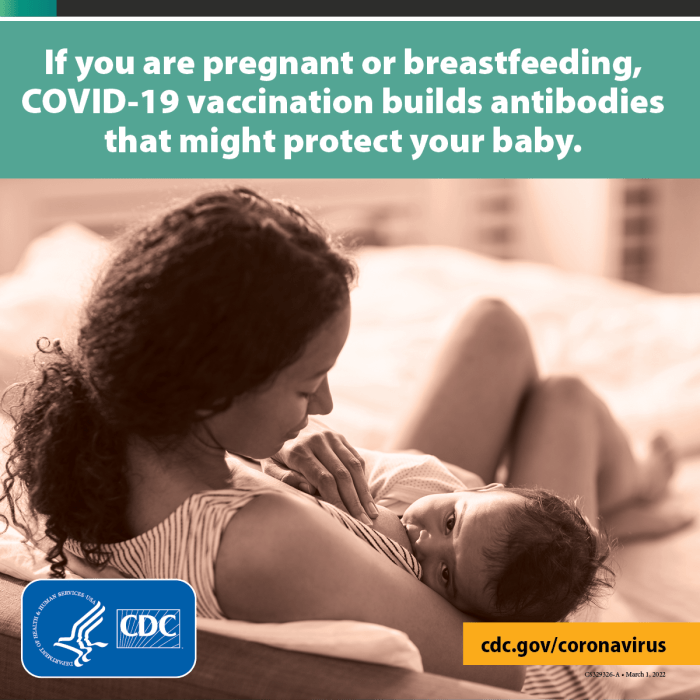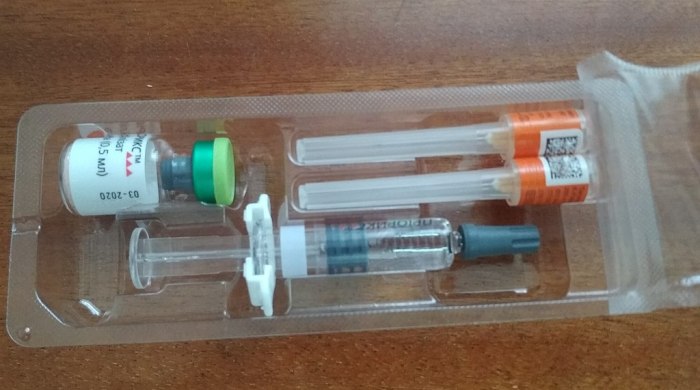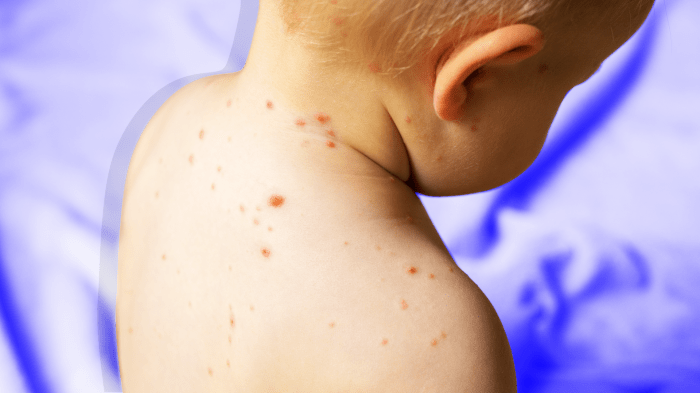
Do you need a measles vaccine booster? This crucial question touches on public health, individual well-being, and the ongoing fight against preventable diseases. Measles, a highly contagious virus, can have severe consequences, impacting both those infected and the wider community. Understanding the necessity of boosters, the potential risks and benefits, and the specific considerations for various groups is essential for informed decision-making.
This comprehensive guide delves into the science behind measles vaccination, exploring the rationale behind booster recommendations, and outlining the factors that influence the need for these additional doses. We’ll examine different vaccination schedules, compare the effectiveness of various vaccines, and analyze the risks and benefits associated with booster shots. By understanding the nuances of measles vaccination, you can make the best decision for your health and the health of those around you.
Vaccine Necessity Overview
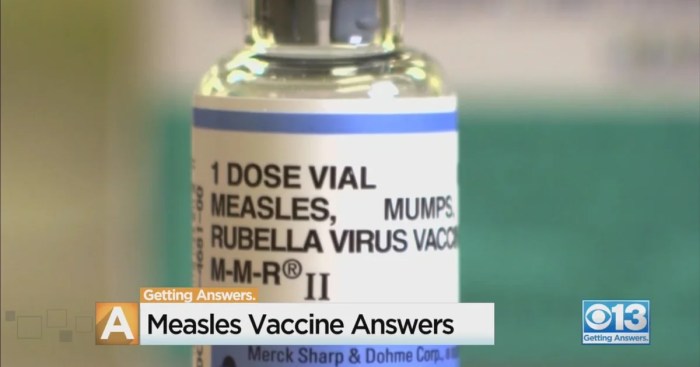
Measles, a highly contagious viral illness, poses a significant threat to public health. Its rapid spread can lead to devastating outbreaks, especially in communities with low vaccination rates. Understanding the necessity of measles vaccination is crucial for safeguarding individuals and maintaining community immunity.Measles is a serious illness that can result in severe complications and long-term health consequences. Proactive measures, such as vaccination, are vital to mitigating the risks associated with this contagious disease.
Vaccination not only protects the vaccinated individual but also contributes to herd immunity, safeguarding those who cannot be vaccinated due to medical reasons.
Measles and Public Health Impact
Measles is a highly contagious respiratory virus. Its transmission occurs through direct contact with respiratory secretions or contaminated surfaces. Outbreaks are characterized by rapid spread, potentially affecting large populations. This high contagiousness necessitates proactive measures to prevent the disease’s spread. The significant impact on public health underscores the crucial role of vaccination in preventing outbreaks and maintaining community immunity.
The virus can cause serious complications in susceptible individuals, highlighting the importance of vaccination in reducing morbidity and mortality.
Importance of Vaccination in Preventing Outbreaks
Vaccination remains the most effective tool for preventing measles outbreaks. It generates a robust immune response, significantly reducing the risk of infection. A well-maintained vaccination schedule is essential for maintaining herd immunity, a crucial defense mechanism against the spread of measles. Herd immunity protects those who cannot be vaccinated, such as infants and individuals with compromised immune systems.
Maintaining high vaccination coverage in a community minimizes the risk of measles transmission, safeguarding vulnerable populations.
Long-Term Effects of Measles Infection
Measles infection can lead to a range of severe complications, impacting various organ systems. These complications can result in long-term health problems, including pneumonia, encephalitis, and hearing loss. The potential for long-term health consequences underscores the importance of preventing measles infection through vaccination. The consequences of measles infection can range from mild illness to severe complications, emphasizing the importance of vaccination for preventing these long-term health impacts.
Wondering if you need a measles vaccine booster? Recent advancements in medical technology, like the new AI procedure used in the first successful pregnancy reported by doctors ( doctors report first pregnancy new ai procedure ), highlight the ever-evolving landscape of healthcare. While these incredible developments are happening, it’s still crucial to stay up-to-date on recommended vaccinations, including measles, to protect yourself and your community.
So, the short answer is, check with your doctor to determine if a measles booster is right for you.
Measles Vaccination Schedules in Different Regions
Vaccination schedules vary across different regions and countries, reflecting public health priorities and epidemiological factors. These variations often consider factors like the prevalence of measles in a particular region and the availability of vaccines. Developing appropriate vaccination schedules is crucial for optimizing public health outcomes. These schedules are carefully designed to ensure optimal protection against measles, taking into account regional variations in disease transmission.
Wondering if you need a measles vaccine booster? While recent news about the health of prominent figures like Mukesh Ambani and Nita Ambani ( mukesh ambani nita ambani ) might not directly answer that question, it’s a good reminder to check with your doctor. Staying up-to-date on your vaccinations is key to protecting yourself and your community.
So, before you dismiss the idea of a booster, a quick call to your doctor will give you the definitive answer you’re looking for.
Types of Measles Vaccines Available
Several types of measles vaccines are available globally, with varying formulations and effectiveness. These vaccines typically utilize live-attenuated measles viruses, inducing a robust immune response. The choice of vaccine depends on factors like the availability of specific vaccines in different regions. The efficacy and safety profiles of available vaccines are rigorously assessed and evaluated.
Effectiveness of Measles Vaccines
Measles vaccines are highly effective in preventing the disease. Studies consistently demonstrate their ability to significantly reduce the incidence of measles cases. Vaccination programs have played a crucial role in dramatically reducing measles-related morbidity and mortality worldwide. High vaccination rates contribute to effective control of measles transmission and the prevention of outbreaks.
Recommended Vaccination Schedule
| Age Group | Recommended Doses |
|---|---|
| Infants (6-11 months) | 2 doses |
| Preschoolers (1-5 years) | 2 doses |
| School-aged children (6-18 years) | 2 doses |
| Adults | 1-2 doses, depending on prior vaccination status |
This table summarizes the recommended vaccination schedule for different age groups. Following the recommended schedule is crucial for achieving optimal protection against measles. Adherence to the schedule ensures individuals receive necessary doses at appropriate intervals, maximizing their immunity.
Booster Considerations
Measles vaccination remains a cornerstone of public health, preventing outbreaks and protecting vulnerable populations. However, the duration of immunity conferred by the initial vaccination regimen is a subject of ongoing discussion, prompting consideration of booster doses. Understanding the rationale behind these recommendations, the factors influencing their necessity, and the evidence supporting them is crucial for informed decision-making.The efficacy of measles vaccines, while high, doesn’t guarantee lifelong immunity for everyone.
This is a complex issue, and several factors influence the potential need for booster shots, including the waning immunity over time in some individuals and the emergence of new strains or variants. A deeper dive into the scientific basis behind booster recommendations will shed light on the nuances of measles vaccine protection.
Rationale Behind Measles Booster Recommendations
Waning immunity, particularly in individuals whose immune response to the initial vaccination was less robust, is a key driver behind the potential need for booster doses. Studies have shown that antibody levels can decline over time, potentially increasing susceptibility to measles infection. This necessitates a careful assessment of the risk-benefit profile for booster doses, balancing the potential for enhanced protection against the potential for adverse effects.
Factors Influencing the Need for Measles Vaccine Boosters
Several factors contribute to the potential need for measles vaccine boosters. Age is a critical factor, as immune responses can vary across different age groups. Furthermore, certain underlying health conditions or immunosuppressive treatments can affect the immune system’s ability to maintain protective immunity. Additionally, individuals who received older formulations of the measles vaccine may require a booster to ensure adequate protection against emerging strains.
Duration of Immunity Conferred by Initial Measles Vaccination
The duration of immunity conferred by the initial measles vaccination is a crucial aspect to consider. While generally long-lasting, evidence suggests that immunity can wane over time. The exact duration of this waning effect varies depending on several factors, including individual immune response and exposure to the virus. This suggests that a booster dose might be necessary to maintain optimal protection, especially in high-risk populations.
Evidence-Based Studies Supporting or Refuting the Need for Booster Shots
Extensive research is ongoing to fully elucidate the optimal timing and necessity of measles vaccine boosters. Some studies have shown a measurable increase in antibody levels following a booster dose, supporting the idea of improved protection. Conversely, other studies have highlighted the lack of clear benefit in routine booster administration, emphasizing the need for a nuanced approach. This research will continue to inform public health recommendations.
Comparison of Different Measles Vaccine Booster Options
Different measles vaccine booster options exist, each with its own characteristics. The choice of booster will depend on various factors, including the specific formulation, the individual’s medical history, and the specific circumstances. Further research is needed to definitively compare the effectiveness of these different options.
Pros and Cons of Measles Vaccine Boosters
| Pros | Cons |
|---|---|
| Potentially enhanced protection against measles infection | Potential for adverse reactions, such as pain, swelling, or fever |
| Reduced risk of measles outbreaks in susceptible populations | Additional cost and logistical challenges in administering booster doses |
| Maintenance of long-term immunity | Limited evidence regarding the long-term efficacy of booster doses |
Circumstances Where a Booster Might Be Recommended
- Individuals with weakened immune systems due to underlying health conditions or immunosuppressive treatments may require a booster to maintain adequate protection.
- Healthcare workers and individuals in close contact with vulnerable populations may benefit from a booster to reduce the risk of transmission.
- Individuals who received an older formulation of the measles vaccine may require a booster to ensure optimal protection against emerging strains.
- Individuals traveling to areas with ongoing measles outbreaks might consider a booster to further strengthen their immunity.
Risks and Benefits of Boosters
Understanding the potential risks and benefits of measles vaccine boosters is crucial for informed decision-making. While boosters can enhance immunity and potentially protect communities, they aren’t without potential side effects. This section will delve into the various aspects of measles vaccine boosters, including potential side effects, long-term implications, at-risk populations, and the benefits of vaccination.The decision to receive a measles vaccine booster hinges on weighing the benefits of enhanced immunity against the potential risks.
Careful consideration of individual circumstances and the overall public health context is essential.
Potential Side Effects of Measles Vaccine Boosters
Measles vaccine boosters, like all vaccines, can induce a range of side effects. These are typically mild and temporary, often resolving within a few days.
- Common side effects include soreness, redness, or swelling at the injection site, fever, fatigue, headache, and mild rash.
- Less common but still possible side effects are allergic reactions, such as hives or difficulty breathing. These should be treated immediately by medical professionals.
- Rare but serious side effects, though extremely uncommon, can include severe allergic reactions, Guillain-Barré syndrome, and neurological complications. These rare complications should be considered within the broader context of the overall risk of contracting measles.
Long-Term Health Implications of Measles Vaccine Boosters
Currently, there is no definitive evidence to suggest significant long-term health implications associated with measles vaccine boosters. The overwhelming consensus from research and medical professionals is that the benefits outweigh the risks for most individuals.
Populations at Increased Risk from Measles Vaccine Boosters
Certain populations might be more susceptible to adverse reactions to measles vaccine boosters. Pre-existing medical conditions, such as weakened immune systems or allergies, can increase the risk of side effects.
- Individuals with a history of severe allergic reactions to vaccines or other medications should consult their physician before receiving a booster.
- Individuals with compromised immune systems, such as those undergoing chemotherapy or with certain chronic illnesses, should discuss the risks and benefits with their healthcare provider before receiving the booster.
- Children, especially those with pre-existing conditions, should have a careful assessment of risks and benefits with their physician.
Benefits of Receiving a Measles Vaccine Booster
Measles vaccine boosters provide a crucial layer of protection against measles, reducing the risk of contracting and spreading the disease.
Wondering if you need a measles vaccine booster? It really depends on your vaccination history. While most people are covered, some recent studies, like the ones from Tim Gill Scott Miller, a leading researcher in epidemiology, highlight the importance of staying up-to-date on vaccinations. tim gill scott miller is constantly pushing for better public health measures.
Ultimately, checking with your doctor is the best way to determine if a booster is necessary for you.
- Boosters enhance the body’s immune response, improving the likelihood of preventing infection.
- Increased immunity through boosters contributes to herd immunity, protecting vulnerable populations who cannot be vaccinated.
- Herd immunity protects susceptible individuals who cannot be vaccinated due to medical reasons, like those undergoing chemotherapy.
Potential for Herd Immunity from Booster Programs
Measles booster programs can significantly contribute to herd immunity, protecting vulnerable individuals. Herd immunity is a form of indirect protection where the majority of a population is immune to a disease, thereby protecting those who cannot be vaccinated.
Herd immunity creates a barrier against the spread of infectious diseases, significantly reducing the risk of outbreaks.
Comparison of Risks and Benefits of Measles Booster Shots for Different Age Groups
The risk-benefit assessment for measles boosters varies across different age groups.
| Age Group | Potential Risks | Potential Benefits |
|---|---|---|
| Children (1-10 years) | Mild side effects like fever, soreness, and rash are possible. Pre-existing conditions may increase risk. | Enhanced immunity against measles, contributing to herd immunity. |
| Adolescents (11-18 years) | Mild side effects are common. Potential for increased risk with pre-existing conditions. | Protection against measles, contributing to herd immunity. Boosting immunity at this crucial stage protects young adults and their families. |
| Adults (19+) | Mild side effects like fever, soreness, and rash are possible. Pre-existing conditions may increase risk. | Protection against measles, reducing the risk of outbreaks and protecting vulnerable individuals in the community. Maintaining immunity throughout adulthood is essential. |
Precautions to Take Before Getting a Measles Vaccine Booster
Taking precautions before receiving a measles vaccine booster can help minimize potential risks.
- Inform your healthcare provider about any pre-existing medical conditions, allergies, or medications you are taking.
- Ensure you are adequately hydrated before and after the booster injection.
- Follow any specific instructions given by your healthcare provider regarding activity restrictions after the booster.
- Monitor yourself for any signs of adverse reactions, and seek immediate medical attention if needed.
Specific Populations: Do You Need A Measles Vaccine Booster
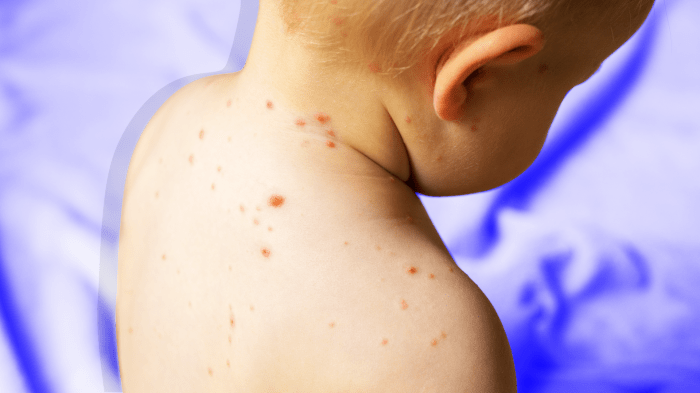
Understanding measles vaccine booster needs isn’t a one-size-fits-all scenario. Different groups face varying levels of risk and require tailored recommendations. This section delves into the unique considerations for specific populations, ensuring everyone receives the most appropriate advice.
Vaccination Recommendations for Pregnant Women
Pregnant women need special consideration regarding measles vaccination. While generally safe, the potential risks and benefits need careful evaluation. Measles infection during pregnancy can pose significant risks to both the mother and the developing fetus. Consultations with healthcare providers are crucial in making informed decisions. Vaccination is generally recommended, especially if there’s a risk of exposure, provided it’s within the recommended timeframe and after consulting with the doctor.
Vaccination Guidelines for Immunocompromised Individuals
Immunocompromised individuals, such as those with weakened immune systems due to conditions like cancer treatment or HIV, may have altered responses to vaccinations. These individuals might require a different vaccination schedule or dosage. Healthcare providers can offer personalized guidance based on the specific circumstances. The key is to discuss vaccination plans with a healthcare provider to ensure the most appropriate approach.
Vaccination Recommendations for Travelers
Travelers need to be aware of the measles vaccination requirements and recommendations for the destinations they’ll visit. Vaccination status is crucial, and ensuring up-to-date vaccination is vital for personal safety and preventing the spread of the disease in their community. Travelers should consult health authorities for specific recommendations related to their destinations. A critical aspect is staying updated on the vaccination requirements for different countries and regions.
Vaccination Requirements for School Attendance
Measles vaccination is often a requirement for school attendance in many regions. This policy is implemented to protect the entire student population and maintain herd immunity. Schools play a vital role in disseminating information about vaccination requirements and schedules. Vaccination requirements help ensure a healthy environment for learning.
Designing a Table Showing Vaccination Requirements for Various Travel Destinations
A table summarizing vaccination requirements for various travel destinations can prove invaluable for travelers. It allows easy access to specific guidelines.
| Country/Region | Measles Vaccination Requirements |
|---|---|
| United States | Generally, two doses of measles vaccine are required for children entering school. Booster shots might be recommended for certain situations, as determined by healthcare providers. |
| United Kingdom | Two doses of the MMR vaccine are required for children entering school. Additional booster doses might be necessary in certain situations, according to the advice of the NHS. |
| France | Two doses of the MMR vaccine are recommended for children. Specific requirements may vary based on the individual’s medical history. |
| Japan | Two doses of MMR vaccine are usually required for school-aged children. Consult the Ministry of Health, Labour and Welfare for detailed information. |
| Brazil | Two doses of the MMR vaccine are typically required for children attending school. Consult the Ministry of Health for the latest information. |
Role of Public Health Agencies in Advising Specific Populations on Boosters, Do you need a measles vaccine booster
Public health agencies play a critical role in providing guidance and recommendations to specific populations regarding measles vaccine boosters. They collect and analyze data on outbreaks, risk factors, and vaccine effectiveness. Based on this information, they develop and disseminate evidence-based recommendations for specific groups, including pregnant women, immunocompromised individuals, and travelers. Public health agencies provide valuable resources and educational materials to facilitate informed decision-making.
Information for Healthcare Providers
Staying up-to-date on measles vaccine recommendations is crucial for healthcare providers. Effective patient care hinges on accurate, current information. This section provides a summary of current guidelines, emphasizing the importance of this information for your practice.Healthcare professionals play a vital role in informing patients about measles vaccine boosters, and this knowledge is paramount for ensuring public health. Accurate and timely information about the necessity, risks, and benefits of boosters is essential for informed decision-making.
Current Guidelines for Measles Vaccine Boosters
Current guidelines emphasize the importance of maintaining high levels of immunity against measles. This necessitates ongoing vigilance in recommending boosters, particularly for vulnerable populations and those with compromised immune systems. The decision to recommend a booster hinges on factors like individual risk assessment, vaccination history, and current epidemiological trends.
Importance of Up-to-Date Information for Healthcare Professionals
Keeping abreast of evolving guidelines is critical for providing evidence-based recommendations. Healthcare professionals must actively seek out and review the latest recommendations from reputable organizations like the CDC and WHO. This ensures that the information they provide to patients is current and accurate.
Criteria for Recommending Measles Vaccine Boosters
Several criteria influence the decision to recommend a measles vaccine booster. These include the patient’s age, vaccination history, and underlying health conditions. Individuals who have received only one dose of the measles vaccine, or whose immunity might be compromised, are more likely to benefit from a booster. Furthermore, areas experiencing outbreaks or elevated community transmission rates might necessitate booster recommendations.
Role of Healthcare Providers in Educating Patients
Healthcare providers play a crucial role in educating patients about the benefits and risks of measles vaccine boosters. Clear communication is essential to address patient concerns and ensure informed consent. Providers should present information in a straightforward, understandable manner, and answer questions thoroughly and accurately. Emphasize that the decision to receive a booster is a personal one, made after considering the risks and benefits.
Summary of Latest Guidelines on Measles Booster Recommendations
| Population Group | Booster Recommendation | Rationale |
|---|---|---|
| Individuals with a history of only one dose of measles vaccine | Strongly recommend | Incomplete primary immunization series may require a booster to reach protective immunity. |
| Individuals with compromised immune systems | Strongly recommend | Reduced immune response may require a booster to ensure adequate protection. |
| Individuals traveling to areas with high measles transmission rates | Consider | Increased risk of exposure warrants a booster for optimal protection. |
| Individuals experiencing measles outbreaks | Consider | Outbreaks necessitate heightened vigilance and potentially increased booster recommendations. |
| General Population with a documented history of two doses | Not recommended (unless specific circumstances warrant it) | Generally, two doses are sufficient to maintain immunity. |
Potential Patient Questions about Measles Vaccine Boosters
- What is the risk of side effects from a measles vaccine booster?
- How long does immunity last after a measles booster?
- Are there any specific contraindications for receiving a measles vaccine booster?
- Is there any long-term data available on the effectiveness of measles boosters?
- How does a measles booster interact with other vaccinations?
Structuring a Patient Consultation Regarding Measles Vaccine Boosters
A thorough patient consultation should include a detailed discussion of the patient’s vaccination history, underlying health conditions, and any potential travel plans. Explaining the rationale behind the recommendation, while acknowledging the patient’s concerns, is paramount. The discussion should address potential side effects, risks, and benefits. Obtain informed consent from the patient before administering the booster. Ensure that the patient understands the importance of following up with any questions or concerns.
Misinformation and Concerns
Navigating the world of health information can be tricky, especially when it comes to vaccines. Misconceptions and anxieties surrounding measles vaccine boosters are unfortunately common. These concerns often stem from fear of the unknown, a lack of understanding about the science behind vaccines, and the spread of misinformation online. Addressing these concerns directly and providing accurate information is crucial to promoting vaccine confidence and protecting public health.
Common Misconceptions about Measles Vaccine Boosters
Many people hold misconceptions about measles vaccine boosters, often fueled by inaccurate or incomplete information. These misconceptions can range from doubts about the vaccine’s effectiveness to concerns about potential side effects. Understanding these misconceptions is the first step in countering them with evidence-based facts.
Scientific Evidence Countering Misconceptions
The scientific evidence overwhelmingly supports the safety and effectiveness of measles vaccine boosters. Rigorous clinical trials have demonstrated the vaccine’s ability to generate a robust immune response, significantly reducing the risk of measles infection. Data from vaccination programs worldwide consistently shows a decline in measles cases in communities where vaccination rates are high. Furthermore, comprehensive safety monitoring systems have identified rare and minor side effects, which are generally short-lived and manageable.
Strategies to Address Vaccine Hesitancy
Addressing vaccine hesitancy requires a multifaceted approach. Open and honest communication about the benefits and risks of vaccines is essential. Healthcare providers play a critical role in educating patients about the science behind vaccines and dispelling myths. Community leaders and influencers can also help by promoting accurate information and fostering trust in vaccination programs. Building trust through transparent communication and addressing concerns directly can be highly effective.
Resources for Reliable Information
Numerous resources provide reliable information about measles vaccines and boosters. Government health agencies, such as the Centers for Disease Control and Prevention (CDC) in the United States and the World Health Organization (WHO), offer comprehensive information. Reputable medical journals and scientific publications provide further insights into the latest research. Seeking information from these trustworthy sources is crucial to combating misinformation.
Importance of Accurate Communication
Accurate communication about measles vaccine boosters is paramount. Misleading statements can undermine public trust in vaccines, potentially leading to preventable outbreaks. Clear and concise communication, emphasizing the scientific evidence, is key to reassuring the public. Healthcare professionals should be equipped with the tools and resources to address concerns and provide accurate information.
Examples of Misleading Statements
Some misleading statements about measles vaccines claim that they cause autism or other serious conditions. These claims are completely unfounded and have been repeatedly debunked by scientific research. Similarly, unsubstantiated fears about the long-term effects of boosters can spread rapidly through social media, creating anxiety and distrust. Reliable information from trusted sources is vital to counter these claims.
Common Misconceptions and Their Factual Counterpoints
| Common Misconception | Factual Counterpoint |
|---|---|
| Measles vaccines cause autism. | Extensive research has definitively disproven any link between measles vaccines and autism. Studies have shown no correlation. |
| Measles vaccines are ineffective. | Extensive clinical trials and decades of use demonstrate the high efficacy of measles vaccines in preventing measles. Booster doses are often necessary to maintain immunity over time. |
| Measles vaccines have serious and long-lasting side effects. | While some minor side effects, such as soreness at the injection site, are possible, serious side effects are rare. Comprehensive safety monitoring systems are in place to identify and address any potential issues. |
Outcome Summary
In conclusion, the decision of whether or not to receive a measles vaccine booster is a personal one, but one grounded in sound scientific principles. While the initial vaccination is crucial, boosters can offer enhanced protection, especially in specific circumstances. Understanding the factors influencing the need for a booster, the potential risks and benefits, and the relevant guidelines for various populations is paramount.
Ultimately, staying informed and consulting with healthcare professionals are key to making an informed choice that prioritizes your well-being and contributes to community health.

